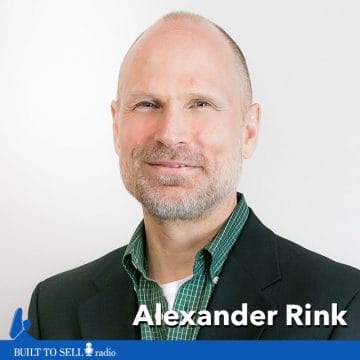About this episode
Alex Rink built 360pi, a software application that provided online retailers with competitive pricing information.
360pi grew into a multi-million-dollar company with 40 employees when Rink began hearing his business might be worth as much as 3-6 times revenue.
Rink felt conflicted.
On the one hand, he was excited about the future of the company. They had a Net Promoter Score in the 40-60% range and an annual recurring revenue retention rate of around 90%. They were profitable and growing.
However, by 2017, Amazon was gobbling up 50 cents of every dollar spent online. They had their own price comparison software, so if Amazon became even more dominant, 360pi’s business could be compromised.
Despite how well things were going, Rink decided to sell. He got three offers and ended up selling to Market Track, a competitor with a similar offering.
Rink’s story includes several critical lessons for aspiring value builders in any industry:
Leave some field to plow: Rink started out selling to online retailers, but he was excited to begin selling to product manufacturers. Rather than attacking the opportunity to sell to manufacturers, Rink pitched the idea to Market Track as a promising new direction they could exploit.
Strategic acquirers pay more: Rink was not entirely happy with his first acquisition offer. Rather than settle, he approached competitor Market Track, which had several synergies to exploit. Market Track had a bigger sales team than 360pi, yet the 360pi product was better. Rink argued that by adding the 360pi to the briefcase of the Market Track salespeople, Market Track could make off like bandits – and therefore, should be willing to pay more for 360pi.
Staged disclosures: One of the dangers of selling to direct competitors is revealing too much. A direct competitor, keen to learn your secrets, could use the veil of an acquisition offer they have no intention to follow through on as a way to learn about your business. To fight against this risk, Rink proposed a staged diligence period where they would reveal increasingly sensitive data the further Market Track progressed in their diligence. The more money Market Track spent on diligence; the more confident Rink felt that they were serious about acquiring 360pi.
There are lots of other tidbits in this episode, including:
- How to manage your dependency on Google search traffic.
- How to approach potential acquirers without saying you’re for sale.
- The criteria for a “clean offer”.
- How to know what an acquirer would be like to work with before you sign a Letter of Intent (LOI).
- How “The prove it challenge” can make or break an acquisition offer.
Measuring your Net Promoter Score is a great way to give an acquirer certainty that you have happy customers, and you’re likely to keep growing in the future. That’s why we’ll survey your customers ever six months when you sign up with The Value Builder System™. Get started for free by completing the Value Builder questionnaire.
Check out our article on How To Get The Attention Of An Acquirer (Without Looking Too Eager).

About Our Guest
With over 20 years experience as a 3-time serial SaaS/Big Data entrepreneur, CEO, Board Director and tech executive, Alex advises CEOs, Boards of Directors, and venture capital and private equity firms on generating growth and successful outcomes for their businesses. Previously, he was the CEO of 360pi, and Chief Growth Officer and head of M&A and merger integration for Numerator, a Vista Equity Partners portfolio company. Prior to starting his entrepreneurial career during the dot com era, Alex was a consultant at Bain & Company and led production material control for a Ford/VW joint venture in Europe. Outside of his advisory work, Alex is giving back to the entrepreneurial ecosystem by serving as a Venture Advisor for Invest Ottawa and Innovation Gatineau. Alex has an MBA from INSEAD, a B.A.Sc. Electrical Engineering from the University of Waterloo, and speaks four languages. When he’s not strategizing growth opportunities or sitting in on web calls, Alex will most likely be found cycling, hiking, reading or spending time with his family.


